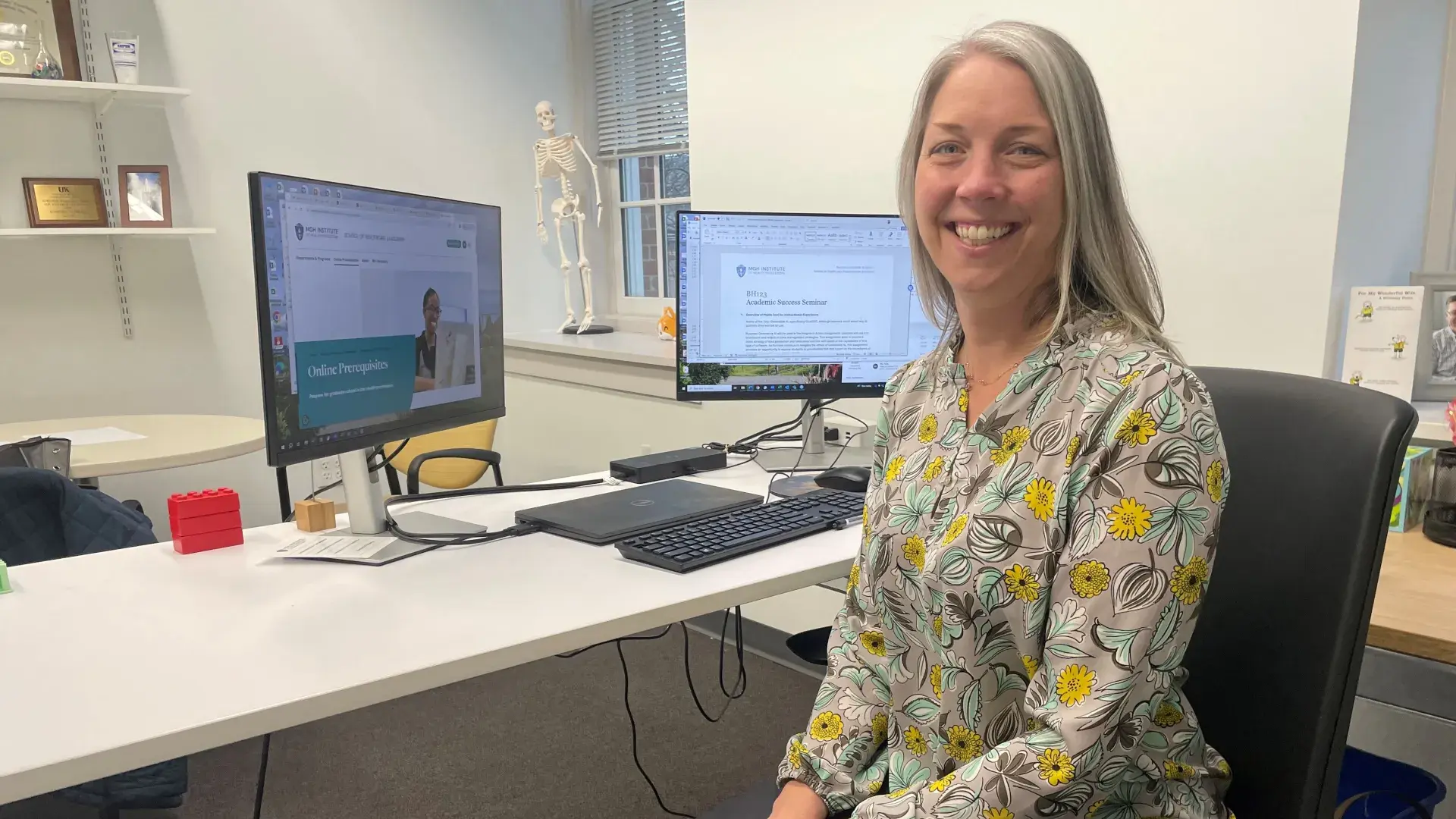
Prerequisites and Health Professions Education coming under SHRS umbrella as part of major reorganization
A new degree program, a new department, an interim chair, additional programs, and prerequisites are making for some busy times at the School of Health and Rehabilitation Sciences, which is undergoing a significant expansion.
For starters, the school is creating a new department called the Department of Health Sciences — this will be home to the new Bachelor of Science in Health Sciences major, a degree program which was approved last week by the Massachusetts Board of Higher Education. The approval comes after an application submission last year, followed by a favorable peer review, and a public posting period required by the state.
“With the Bachelor of Science in Health Sciences (BSHS) degree, we are expanding our degree offerings,” said Dean Laura Plummer. “The Bachelor of Science in Health Sciences opens up new pathways for students to continue into our graduate programs. It expands the possibilities for those aspiring to enter the health professions.”
The Department of Health Sciences will be led by Kim Mace, who will serve as interim chair. She has been overseeing the growth of the prerequisite program since she arrived at the MGH Institute in 2021.
“I see this department providing an academic home both for our existing prerequisites program and a broader vision for where we’re going next. The Bachelor of Health Science program fits perfectly in this department and provides an opportunity for growth,” Mace comments.
Plummer said Mace’s success with growing the MGH Institute’s prerequisite program in an extremely competitive market will serve her well in this role.
“Kim has done an outstanding job expanding our prerequisite program in an incredibly competitive market,” said Plummer. “She truly understands the needs of the students and I am confident she’ll bring that same dedication to our BSHS students. Her skill in curriculum development, commitment to student success, and dedication to faculty development will ensure a high-quality program.
“Individuals can earn their bachelor's here, and that is a massive and ambitious step for the IHP in diversifying our identity as a graduate school,” said Mace. “I think this step will bring us to the forefront within a larger competitor market. In addition to attracting more learners, this distinction will position us well within Mass General Brigham as we continue to be their premier workforce development entity and academic unit.”
Plummer says the BSHS aligns with the Institute’s mission of diversifying the health professions to be able to provide care for a complex society. And it dovetails well with the Early College Pathways Program Plummer is working on with Charlestown High School. Here, students visit the Institute for an introduction to audiology, speech-language pathology, physical therapy, occupational therapy, nursing, and simulation activities, among others.
The degree program is built for students who earned an associate’s degree at a community college or those who began coursework at a four-year institution but never finished.
“With the launch of the bachelor completer degree, we now have a full educational pathway for students,” said Plummer. “They can go from high school to earn an associate's degree and then to the IHP for a bachelor’s and graduate degree to launch and advance a career in the health professions.”
Along with the new degree program, the Health Professions Education Department (HPEd) is moving under the SHRS umbrella.
“The HPEd Department attracts interprofessional and global students who want to advance health professions education,” said Plummer. “They offer several certificate programs and multiple pathways to earn a PhD and strengthen skills as educators and scholars. “We have a commitment to the scholarship of teaching and learning in SHRS, so the addition of the HPEd program provides even more opportunities for collaboration, research, faculty and staff development.”
HPEd Department Chair Roger Edwards says these organizational changes mean important efficiencies and synergies that will strengthen collaborative efforts across the Institute.
“In addition to our historical high numbers of MS-HPEd and PhD students who are faculty at medical and nursing schools, we are seeing growth in the number of HPEd PhD students who are faculty at the other health professions schools through the new Accelerated Pathway to the PhD,” said Edwards. “They overlap with the SHRS academic units, and their research efforts enable new opportunities for partnership and interprofessional scholarship that will further highlight the IHP’s leadership in this area.”
Prerequisites will be moving too.
“Having prerequisites is an excellent opportunity for our school to prepare students to be successful and develop pathways into our graduate programs,” said Plummer. “We have data to suggest that students who complete the prerequisite courses at the IHP are likely to be even more successful in our programs. In the end, the bachelor completion program and prerequisites help with guaranteed pathways and pipelines into the MGH Institute.”
“We have a guaranteed pathway for learners who want to complete their degree with us,” noted Mace. “We can tell students, ‘We can get you into that nursing program. We can get you into that PT program. If you're successful in our bachelor's program, you'll have a seat in our professional program.”
Do you have a story the Office of Strategic Communications should know about? If so, let us know.
